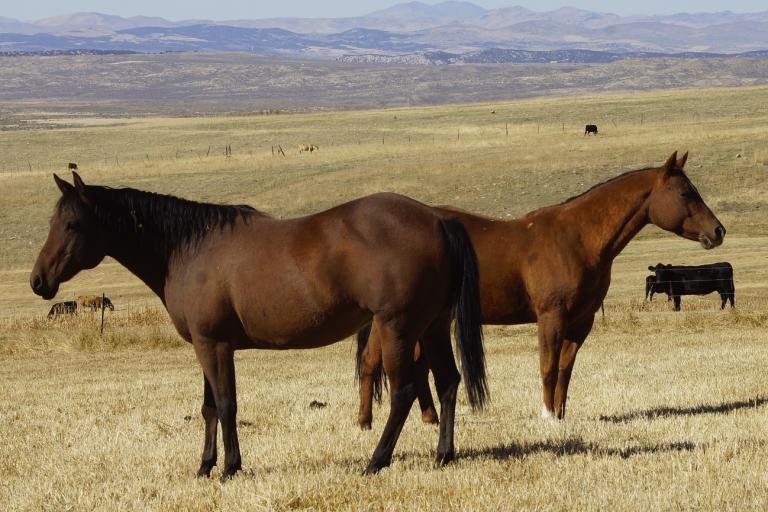MYH1 Myopathy
MYH1 Myopathy is an autoimmune disease where a horse can have an immune reaction against its own muscle cells. There are two clinical presentations of MYHM:
Immune-mediated myopathy (IMM) and non-exertional rhabdomyolysis.
The tested genetic mutation is a risk factor for these conditions. The disease is incomplete autosomal dominant and occurs in Quarter Horses and related breeds.
Symptoms
Horses with the MYH1 mutation may show different disease presentations. Some horses with the mutation never develop symptoms. Affected horses are most likely to develop symptoms before the age of 8 years or after the age of 17 years.
Immune-mediated Myositis – chronic symptoms including muscle stiffness, weakness, malaise, and/or acute episodes of extreme muscle wasting (for example, 40 % of the skeletal muscle mass can be lost in 72 hours).
Non-exertional rhabdomyolysis – evidence of muscle damage in the absence of exercise, with high muscle enzyme levels in the blood, dark urine, hard, stiff muscles, and sometimes symptoms similar to tying-up.
General Information
In the Immune-Mediated Myositis (IMM) form of the disorder, lymphocytes (immune cells) migrate into the muscle fibers and an immune reaction occurs against the horse's own muscle cells. This may cause quickly progressing muscle loss which may take many months to return to the previous condition. Acute episodes of IMM and non-exertional rhabdomyolysis can be triggered by environmental factors.
Horses with two copies of the risk variant (My/My) are predisposed to more severe episodes of IMM and are less likely to have an obvious trigger than those with one copy (n/My).
Test Information
This tests detects the change of a single basepair (chr11:52993878T>C; E321G) in the MYH1 gene.
Genotype and Lab Report
Inheritance: autosomal dominant with incomplete penetrance.
→ Horses with one or two copies of the variant (n/My or My/My) are at high risk to develop IMM. Symptoms are triggered by environmental factors, such as infection or vaccination.
Genotypes:
n/n = normal
The horse has no predisposition for IMM and therefore cannot pass it on to its offspring.
n/My = at risk-affected (heterozygous)
The variant will be passed on to its offspring with a probability of 50%.
My/My = high-risk affected (homozygous)
The variant will be passed on to all its offspring.
Recommendations
Horses with one or two copes of the My risk factor should space out when vaccines are administered. Intranasal (rather than intramuscular) vaccines should be used when available, and the strangles vaccine should be avoided. Immune stimulants should also be avoided.
Horses with clinical symptoms should not be used for breeding. Horses without symptoms which have the risk allele should only be bred to normal (n/n) tested horses to avoid; offspring should be tested and normal (n/n) horses should be prioritized for breeding to step-wise reduce the frequency of the variant in the population.
The My variant is most common in Quarter Horse working cow and reining lines but can be found in other lines and in related breeds such as Paint horses and the Appaloosa breed.
Literature
Gianino et al., (2019). Prevalence of the E321G MYH1 variant for immune-mediated myositis and nonexertional rhabdomyolysis in performance subgroups of American Quarter Horses. J Vet Intern Med. 33:897-901. https://doi.org/10.111/jvim.15393.
Valberg, S.J. et al. (2018). An E321G MYH1 mutation is strongly associated with nonexertional rhabdomyolysis in Quarter Horses. J Vet Intern Med.1-8. https://doi.org/10.111/jvim.15299.
Durward-Akhurst, S.A., Valberg, S.J. : Immune-Mediated Muscle Diseases of the Horse. Vet Pathol 55:68-75, 2018. Pubmed reference: 28129093. DOI: 10.1177/0300985816688755.
Finno et al. (2018). A missense mutation in MYH1 is associated with susceptibility to Immune-mediated myositis in Quarter Horses. Skelet Muscle 8(1):7. https://doi.org/10.1186/s13395-018-0155-0.
Further information is available at Online Mendelian Inheritance in Animals.

